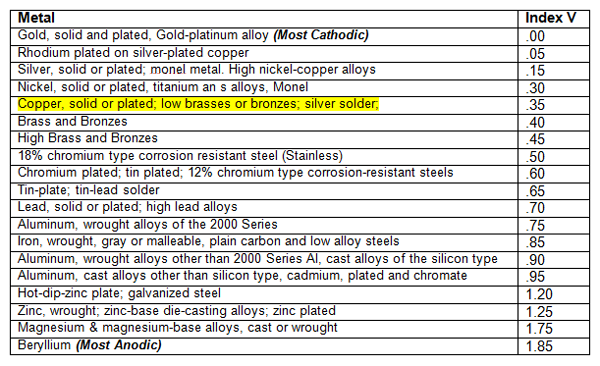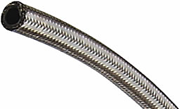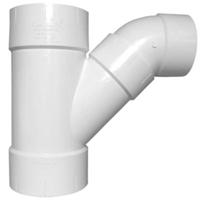| 1/4 Turn | See Quarter Turn | |
| 2-1/2 Lb. Lead | Usually describing sheet lead, 2-1/2 lbs. per square foot. | |
| 4 lb. lead | Usually describing sheet lead, 4 lbs. per square foot. | |
| AB 1953 | AB1953 is the California state-level legislation act that was created in 2006, and became effective in January 2010. It essentially prohibits any materials that handle potable water from containing more than .25% of lead. It makes no distinction between commercial and residential applications. There are unique rules associated with that measurement, along with applicable methods. A copy of this act is available from our office. It is notable that the state of Vermont duplicated the requirement and placed it in force also in 2010. Maryland followed in 2012. A copy of this act is available from our office | |
| Acidic | Water that has a pH level less than 7 | |
| Activated Carbon | Highly porous granules used to adsorb (collect on surfaces) molecules of undesirable substance in water supply.
| |
| Aerate | The action of adding air to water | |
| AGA | American Gas Association, the governing body that regulates code requirements for products that handle gas. | |
| Air Control Valve | Device used to replace air in a plain steel tank. | |
| Air Gap | Product or system design, which provides physical separation between outlet and receptacle to prevent back – siphoning. | |
| AISI | AISI stands for the American Iron and Steel Institute. If you want to know anything about steel or iron, this is the resource to visit. | |
| Alkaline | Water that has a pH higher than 7, also know as basic | |
| Alloy | A metal that is made up of two or more metallic elements | |
| Angle Stop | Basic stop valve function, laid out in an elbow (right angle) configuration. | |
| Angle valve | Globe type of valving, housing laid out in basic right – angle shape. | |
| Anneal | To subject metal to high temperature in order to relax tensions (hardness) Produced y drawing process. | |
| Anodic | A material that is positively charged | |
| Anodic Index | 
| |
| ANSI | American National Standards Institute. Formed in 1918, ANSI has been responsible for writing and codifying many standards that are in use in the plumbing industry. ANSI creates standards that are above any beyond physical property specifications if objects, but business method standards as well. | |
| Anti-Siphon valve | This is a valve that prevents back siphoning that could possible contaminate the public water supply. Essentially, it is a upgraded check valve. | |
| ASME | The American Society of Mechanical Engineers. An organization dedicated in writing specific detailed engineering standards. | |
| ASTM | American Society for Testing and Materials. Formed in 1898, ASTM became an authority to create standards for creation, specifications, designing and testing of materials. Now known as ASTM International, they have grown into a standards management organzation that actively involves industry leaders to help create standards for much more than materials. | |
| Automatic Pilot Valve | Device which senses whether pilot burner is lit. Maintains total gas supply to heater when pilot burner is lit. Shuts off total gas supply to heater when pilot flame goes out. | |
| AWWA | Found in 1881, the American Water Works Association is an scientific and educational association founded to improve water quality and supply.
| |
| Back siphon | A condition in which contaminated water is drawn into a supply system through a combination of a submerged outlet and negative pressure. | |
| Back – Pressure | Backflow caused by pressurization downstream which is greater than supply pressure. | |
| Back – Siphoning | Backflow caused by a negative pressure upstream which “sucks” downstream fluid. | |
| Backflow Preventer | Device which sense whether pilot burner is lit. Maintains total gas supply to heater when pilot burner is lit. Shuts off total gas supply to heater when pilot flame goes out. | |
| Backsplash | A type of wall-hung lavatory which includes a short apron a the rear to protect the wall. | |
| Ball clay | A very high plastic high-firing clay that is mined in very specific areas of the world that fires to a light buff when not glazed. It delivers the plasticity needed for ceramic sanityware, without it manufacturing sophisticated ceramic products would be impossible. One of the largest deposits of ball clay in the world is located in Tennessee and Kentucky. | |
| Ball Stopper | Type of stopper component used with tank type flush valves. | |
| Ball Valve | Valving concept involving rotation of drilled ball in passageway. | |
| Ballcock | Valve used to refill water closet tank. | |
| Barrier – Free | Architectural term used to describe building layout and fixture design which meets the needs of handicapped persons. | |
| Basket Strainer | Typically a stainless steel cup body that is installed in the drain holes of a typical sink which is 3-1/2" wide. Most strainers come supplied with a crumb strainer that captures waste debris so the homeowner can prevent organic chunks falling into the sewer system. | |
| Batch Feed | Type of disposer design in which garbage is fed into a unit one load at a time, activated by placing stopper into opening. | |
| BC | Abbrevation for Ballcock. | |
| Bedpan Closet | Toilet – like fixture used for disposing of bedpan contents and for rinsing. Sometimes called “clinic service sink,” or “flushing rim sink.” | |
| Bedpan Washer | Fitting used for washing bedpan in conjunction with conventional toilet. Hose or swing – down types most common. | |
| Bend | Elbow – like fitting used with soil pipe systems. | |
| Bidet | A fixture used for purposes of personal cleansing. | |
| Black Iron | In the plumbing industry, this refers to "Black Iron" systems that is comprised of black steel pipe and black malleable fittings and nipples. | |
| Blowdown | The difference between the set pressure level and reset level on a safety or relief valve. | |
| Blowout | flushing design concept relying entirely on high water volume, no siphoning action. | |
| Boiler | Heating plant used to create hot water or steam. | |
| Boiler Drain | An economical compression stop valve that has a single 3/4" MGHT threaded outlet for easy hose connection. | |
| Bonnet | Component of valve structure, which houses stem and stem sealing components. | |
| Booster Pump | Concept used in booster pump systems to trigger activation of pumps in cumulative sequence. | |
| Booster Staging | Concept used in booster pump systems to trigger activation of pumps in | |
| Bottom Punch Plate | A nail plate that is designed to be attached on the bottom/sole plate, see this illustration for more detail. | |
| Bowl | Term sometimes used to describe compartments of sinks (single bowl, double bowl, etc.). More commonly, it is the lower portion of a tolet. | |
| Braided | Usually an outer weaving that is designed to be over a weaker inner tube to provide strength. Usually the weaving is in stainless steel or a polymer. | |
| Brass | A term sometimes used interchangeably with faucet. | |
| Brazing | (See Soldering) a higher - - heat version of basic soldering process. Results in stronger bond. | |
| Brine | Salt in solution with water. | |
| Bronze | An alloy that is mainly comprised of copper and tin. Typical percentages are 88% and 12% respectively. It is a hard and brittle metal that is often confused with brass. With a few exceptions, brass is copper with zinc rather than tin | |
| Bronze Fitting | One type of fitting used with copper systems, made by casting (molding) process. | |
| BTU | A unit of heat measurement (abbreviation for British Thermal Unit). | |
| Bubbler | Outlet orifice and shield component used on water coolers and drinking fountains. | |
| Building Drain | Primary horizontal drainage channel in DWV systems, connects to outside Sewer or septic system | |
| Bullhead Tee | The is a tee fitting that the branch outlet size is larger than any of the main run ends. | |
| Bushing | Reducing fitting with male – to – female connections. | |
| Butterfly Check | Check valve with two “flappers” which pivot in the stream. | |
| Butterfly Valve | Valving concepts involving rotation of a thin wafer in the passageway. | |
| Bypass | In two –handing shower valve deign, a provision to connect risers to supply an Installation on the floor above. | |
| C | 1. Usually an abbreviation to mean 'Copper' in many databases. Cu is the actual element abbreviation.
2. C in a unit of measure is a lot of one hundred.
3. It can also be used to describe a copper hub in a copper fittings. The OD of the copper tube fits inside the hub.
| |
| Cap | Fitting with female connection to close off pipe end. | |
| Carrier | Structural device used to support wall –mount fixtures such as water closet, urinals, lavatories. | |
| Cartridge | Mechanism in which replaceable parts are incorporated into integral unit. | |
| Cast Brass | This is another method of manufacturing copper fittings as compared to WROT. Cast fittings enable more flexibility when creating the basic shape and it is refined easier. | |
| Cathodic | A material that is negatively charged | |
| Caulk | Versatile repair compound used to seal pipe joints, leaky pipes, cracked fixtures etc. | |
| Cavitation | Condition caused by turbulence whereby portions of liquid are vaporized into bubbles and then collapsed, resulting in noise and possible damage. | |
| Center Mount | Faucet model which install into single fixtures hole. | |
| Centerset | Lavatory faucet model which mounts into 4” centers. | |
| Centrifugal Pump | Pump which uses operation concept based on centrifugal force. | |
| Chain Wrench | Type of wrench in which a chain is wrapped around a round object and secured by a binding action. | |
| Check Stop | Stop valve with built – in check valve provision | |
| Check Valve | Device which permits relatively free in the intended direction, but blocks flow reversal. | |
| Chemical Feeder | Device used to inject measured quantities of chlorine and / or other needed chemicals in water supply. | |
| Children Toilet | Water closet which is short in height, equipped with a special size seat. | |
| Chlorination | Process of disinfecting harmful organisms in water supply by means of contract with chlorine. | |
| Chlorine Demand | Amount of chlorine actually needed to disinfect a given water supply. | |
| Chlorine Dosage | Amount of chlorine actually used to disinfect a given water supply. | |
| Chlorine Residual | Amount of chlorine left over if dosage exceeds demand. | |
| Chrome (Tubular) | Typically used in a commerical application and the connections are explosed to open sight. In some cases, usually by specifications 17 gauge is required; otherwise, the lightest gauge available is usually installed (20/22 gauge). | |
| Class | Typically used when categorizing certain fittings such as flanges. Classes 150 and 300 are common. They are noted and referred to as 150# or 150LB. This does not mean that they are rated for 150psi, as pressures vary according to temperature of the fluid/gas. Class 150 is a standard of flange thickness and bolt pattern and size. There are classes from 150 to 2500. | |
| Class 125 | Class 125 in regards to bronze fittings rates a maximum pressure rating of 125 PSI at a temperature of 400° F. At lower temperatures the allowable pressure increases to a maximum of 200 PSI at temperatures of 150° (65.5°C) and lower, as per the ANSI / ASME B16.15 - TABLE 1 PRESSURE / TEMPERATURE RATINGS copied below.
| ANSI / ASME B16.15-1 TABLE 1 PSI RATINGS BRONZE CLASS 125 AND 250 |
TEMP F°
|
CLASS 125
|
CLASS 250
|
| -20 |
200 |
400 |
| 150 |
200 |
400 |
| 200 |
190 |
385 |
| 250 |
180 |
365 |
| 300 |
165 |
335 |
| 350 |
150 |
300 |
| 400 |
125 |
250 |
| |
| Classroom Sink | Fixtures which combines functions of sink or lavatory with that of drinking | |
| Closet | A synonym of toilet. | |
| Closet Bend | Fitting used to connect water closet flange to soil pipe system. | |
| Closet Elbow | Fitting used to connect water closet flange to soil pipe system. | |
| Closet Flange | A brass flange that is soldered or "wiped" into a lead (pb) waste bend. There are a few variants are standard, deep or offset. | |
| Closet Spud | A brass transition fitting that is fitted onto the toilet that accepts a flush valve tailpiece. The first dimension is the size of the china inlet and the other is the threaded connection for the flush valve. | |
| Cock | A broad classification of valves which generally employ a plug valve concepts of valving. | |
| Cold Solder | A caulking and repair compound which contains metal in a powdered form. | |
| Combination | Is a a wye with a gradually-curving central connecting branch that "combines" a 45° (or 1/8 bend) fitting with a wye that finally produces a 90° branch. It is used in a drain line for a smooth, gradually-curving path to reduce the  likelihood of clogs, to ease the pushing of a plumber's snake through a the line and to encourage water flow in the direction of the drain. likelihood of clogs, to ease the pushing of a plumber's snake through a the line and to encourage water flow in the direction of the drain. | |
| Combination Gas Control | unitized control commonly used on gas water heaters which combines all necessary gas controls. | |
| Combination GasCtrl | Unitized control commonly used on gas water heaters which combines all | |
| COMP | Abbrevation for compression, usually describing a connection type. | |